- Home
- Ann M. Martin
Belle Teale Page 2
Belle Teale Read online
Page 2
“Is dinner ready?”
“Yes, indeed. Go get your mother. But tell her she can’t come to the table unless she’s clean,” which is Gran’s way of saying Mama had better put that cigarette out.
A few minutes later, Mama and Gran and me are sitting around the table, holding hands. Gran’s eyes are squeezed tight shut as she says, “Heavenly Father, bless this food to our use and us to Thy service. We beg for Christ’s sake. Amen.” I am watching Gran, who looks so holy when she is conversing with the Lord. Mama is gazing out the window. She probably has Mr. Titus and double shifts and other work things on her mind.
When the blessing is over we dig into the food. I don’t know how Gran manages to put together our meals day in and day out. Mama, she earns the money for what food we have to buy, but Gran, she is in charge of the cooking, and as far as I can see that is some job. I reach across the table and give Gran’s hand a pat.
“Now, what is that for, Belle Teal?” she asks me with a little smile.
“Nothing,” I say, with a smile back.
Mama looks up and smiles at both of us. Then she says to me, “All ready for school?”
“Yes, ma’am.”
“You got enough pencils and things?”
“I think so.”
“And you finally have Miss Casey.”
“Yes!”
“Who all is going to be in your class this year?” Gran wants to know.
“Oh, you know. All the regulars,” I say. “Clarice. And Little Boss. And Chas and Vernon.” I make a face.
“Belle Teal . . .” says Mama with a warning in her voice.
“I am not judging Chas and Vernon based on their appearance,” I tell her. “I am judging them based on what’s inside. I know their insides and they’re mean.” I think for a moment. “Mama, is it wrong to hate someone —” I start to ask.
“It is wrong to hate anyone,” Mama replies quickly.
“But is it wrong to hate someone because that person hates other people?”
Mama sighs. She looks like she wishes she had a cigarette. “Hate just creates more hate,” she says finally.
I think of those school meetings Mama went to over the summer. The meetings the parents held after it was announced that the colored students would be going to Coker Creek in the fall. Mama couldn’t get to all the meetings, but she got to some of them. And she came home from them looking tired and a little angry. She said she didn’t think she was a very popular person. But when Mama believes something she sticks to her guns about it. And she speaks up. Says the Lord gave her a mouth and she intends to put it to good use.
“Sounds like everyone is putting their mouths to good use,” I told her after one meeting. “Only most people have something different to say than you do.”
“I know.” Mama didn’t talk too much about those meetings.
And eventually it didn’t seem to matter who thought what, because it turned out the colored students were going to go to Coker Creek in any case. “It’s not the parents’ decision to make,” said Mama. “It’s the law. Although I’m sure the parents will have more to say on the subject.”
Now Gran puts down her fork and directs her gaze at Mama. “You don’t think there’ll be any trouble at school tomorrow, do you?” she asks.
Mama shakes her head. “Nope. It’s all died down. Besides, this isn’t Little Rock.”
“Little Rock? The Little Rock Nine?” I say. Everyone has heard about the Little Rock Nine, the nine colored students who were chosen to integrate Central High School in Little Rock, Arkansas, a few years back.
“Those poor children,” murmurs Gran. “Heavens. What they went through. . . . Oh! Adele, honey, I just remembered. We are almost out of sugar. Tomorrow could you stop and pick us up another bag?”
I look at Mama with my mouth hanging open, but I know enough not to say anything. I can’t bear to hear Mama patiently answer Gran, though, so I scoot my plate over to the sink, grab my journal, and head for the front porch.
“Belle Teal!” Mama calls after me. “The dishes.”
“Can I write first, please? Before the sun goes down?”
“Yeah, precious. Okay.” Mama only sounds a little exasperated.
On our porch I sit in the old lawn chair, the one with the scratchy green and white strips that are coming apart. I draw my legs up underneath me and open my journal in my lap. I don’t lift my pen right away, though. I take in a deep breath and look out over our hills. I think how Gran has lived in these hills all her whole life. She can tell you everything about them — their weather and their trees and their animals. Gran, she reads the weather with one finger and her nose. Every morning she stands on the porch, holds up one thin pointer finger, and sniffs the air. “Hot today,” she’ll say. Or, “Snow coming.” Or, “No rain yet.” Lately, though, her predictions haven’t made much sense. For instance, this morning she stood here in the little light summer nightie that is the only one she’ll wear anymore, put her finger in the air, sniffed, and then looked at our broken thermometer, the one that’s been stuck on forty degrees for three years now. And she said, “My land, only forty. It’s going to be downright chilly today.”
Now Gran knows as well as Mama and me that that thermometer is broken, so I don’t know what’s got into her head. It’s a good thing I pick up on facts pretty easy, because these days I have to sort out the facts from Gran’s new brand of fiction.
I pick up my pen. I start to write about how I don’t look a thing like Gran. Gran is all skinny and birdish. Tiny too. And before her hair went white it was pure blonde. I’ve seen pictures of her as a girl. Me, I’m darker, like Mama, and I’m a bit on the plump side, which I guess I take after my daddy. Plus, I’m growing fast as a weed right now. Soon I’ll be taller than Gran.
I am writing all this when behind me I hear Gran ask Mama about that sugar again and I want to leap up out of the chair and shake Gran by her bony shoulders. Then I think to myself about what Mama has said to me so many times: “We have faced lots of hardships, Belle Teal. You and your gran and I. But we can take care of ourselves. We do whatever is necessary. We have strength and patience.”
I look up at the sky. I don’t know if there is a God up there or not. Gran is sure her Lord resides there, but I am still making up my mind. I know I get some comfort from looking at the sky, though. So I gaze at the streaky clouds turning salmon pink as the sun drops low, and I tell myself to have strength and patience where Gran is concerned. While I am at it, I wish that a little strength and patience would flow into the minds of the people who are making judgments about the colored students, and then I wish for extra strength and patience for the colored students themselves.
I write a few more sentences in my journal. Then I go inside to do my chores and get ready for my first day of fifth grade.
The sun wakes me the next morning. I jump out of bed in a big hurry. It is going to be another blazing hot day, and I imagine sticky seats and desktops, and heavy air hanging in our classroom. But mostly I think about Miss Casey and how wonderful fifth grade is going to be. I pull on my green shift, the one Gran made for me in the spring. It wasn’t the best-looking shift then, and five months later I am starting to pop out of it in a few places. I jam my feet into my old brown boots. They are the only shoes I ever wear, no matter what the season, when I bother with shoes at all.
“Precious, why don’t you let me braid your hair?” is Mama’s greeting to me as I sit down to Gran’s breakfast of eggs and biscuits.
“Oh, Mama,” I say. Braiding always takes so long.
“Just for your first day of school,” she says.
I think of standing there while Mama tugs and pulls. “I look okay,” I tell her finally, and Mama gives up.
I suspect I am not looking my best for the first day of school. I don’t think Miss Casey will mind loose hair, though.
When breakfast is over (I always eat a good, big breakfast), I rush around gathering up the things I will need for school: note
book, pencil case, changepurse, lunch in a bag.
“Bye, Mama! Bye, Gran!” I call as I run out the door. I fly across our yard and wait by the road. I can see the school bus wheezing up our hill.
The bus draws to a stop and I wave madly at Bernette, the driver, before she even opens the door.
“Hello, Bernette!” I cry as I board those three steps.
“Welcome back, Belle Teal,” she says, and she flashes me a wide grin.
Bernette and me, we never get to see each other over the summer.
I give Bernette a peck on the cheek and then I stand at the head of the aisle and look at the faces in the bus, trying to spot Clarice. Just as I see her waving to me from the third row of seats I hear something like a little snort down at my side. Sitting in the very first row of seats, directly behind Bernette, is a girl I have never seen before.
Lordy, she is proper looking.
I glance at my shift with the stitches popping apart and the stain on the hem, and at my dusty boots. Then I look at the new girl again. Her blonde hair is silky and shiny and pulled back from her face with a yellow-and-white-striped ribbon. And she is wearing an outfit I think I might have seen in the Sears catalog — a yellow skirt-and-sweater set, very soft looking. And black shoes that are patent leather like Mama’s belt. And white tights. By lunchtime this girl is going to be roasting.
I can’t help myself. I stare at her. I look at her hair ribbon, and then my eyes glide all the way down to those shoes, then back up to the ribbon.
The girl looks me in the eye and snorts again. Snorts like a pig.
I frown at her.
“Nice dress,” she whispers as I start to pass by her.
“Who are you?” I ask.
“I am Vanessa Mathers, and I come from Mechanicsville.”
“Nice to meet you,” I reply. I head for Clarice.
While this has been going on, Bernette has been engaged in the daily struggle that takes place in front of my house. She has to turn the bus around. I am the only kid who lives up here on the hill, so after Bernette reaches my stop, she groans and pants and lets out sighs that puff up her gray bangs while drips of sweat form on her temples. She turns and turns and turns that steering wheel as she swings the bus into our drive, backs it up, and heads us down the hill again.
I am fully settled next to Clarice before Vanessa Mathers realizes what Bernette has been up to. Vanessa turns around and glares at me. “You mean we had to drive all the way up here just to pick you up?” she asks.
I think about my conversations with Mama the night before — about being nice to new kids and hate creating hate and all. I don’t want to judge Vanessa on her appearance, but I believe she is judging me on mine. Which I don’t like it. Chas and Vernon, for instance, they got to know me before they showed their mean selves. Still, I decide to hold my tongue for the present. I just smile sweet-like at Vanessa Mathers.
Vanessa, she makes quite a face at me before she swings her shiny hair around and rides the rest of the way to Coker Creek Elementary with her eyes fixed on the back of Bernette’s head.
Clarice and me shrug our shoulders at each other. Then we start gabbing away. Mostly about Miss Casey, but also we try to figure out what will happen on The Edge of Night this afternoon. We manage to ignore Chas and Vernon, who are sitting in the very last row of seats throwing spitballs down the bus aisle. One hits Vanessa Mathers and I know she feels it, because she squirms her head just a little, but she will not turn around and look. Only when Bernette glances at the boys in the enormous rearview mirror and says quietly, “Enough,” do the boys finally stop. That Bernette, she could be a principal or something.
By the time Bernette pulls up in front of Coker Creek Elementary, Clarice and me are busting with excitement.
“Let’s try to sit in the first row,” I say. “Next to each other. And right in front of Miss Casey.”
“Okay.”
We wave good-bye to Bernette and skitter off the bus.
Then we come to a screeching halt.
Parents — I guess they are parents — are lined up along the walkway to the front doors of Coker Creek. Me and Clarice will have to pass between them, like we are in a parade.
Clarice frowns at me. She pushes her blue glasses nervously up and down the bridge of her nose. “What’s going on?” she asks.
“Don’t know.”
The parents are standing there, watching the kids that stream off the buses or climb out of cars. They are not saying a word, but their faces are thunderclouds. A few of them have handmade signs, which they are not holding up yet. I try to read them upside down. I think I see a lot of words that begin with N, but I am afraid to stare at the signs for too long.
I feel my face grow warm, like I’m embarrassed, even though I haven’t done anything. And I know the underarms of my shift are turning a darker shade of green because now I’m sweating. I jam my hands down at my sides so no one will see.
“Come on,” I say to Clarice, and we walk fast inside the building, and directly to room 6.
The door to our classroom is open, and someone has hung a huge yellow paper sun on it. Written on the sun is:
Room 6, Grade 5
Miss Casey
WELCOME!
All those questions that were forming on my tongue — the ones about the angry parents and their signs — melt away at the sight of Miss Casey at her desk. Clarice and me, we zoom into the room and slide into two seats next to each other, right in front of Miss Casey. We can barely see her, though. A bunch of kids are clustered around her and she’s talking quietly to them, smiling.
“Hey.” A soft voice behind me. A nudge on my shoulder.
I turn around. There is Little Boss. “Hey!” I cry.
Me and Little Boss have not seen each other all summer. (There’s a lot of people I don’t see all summer.) I grin at him. We have been friends since he moved here just after third grade began. Not everyone likes Little Boss, but I do. Despite his faults, which are many. Whenever those faults come rearing up, I remind myself about what goes on at Little Boss’s house. Now, I have never actually been at his house, but in a town the size of Coker Creek, everybody pretty much knows everybody else’s business, or thinks they do, and a lot of what a person hears is true. Chas, he used to live next door to Little Boss. This was before Chas’s father started his painting business and made enough money to buy a house closer on in to town. Chas and Little Boss got to be friends, and Chas, he used to tell me and Clarice what he would hear on the nights Big Boss had been out drinking. I do not know how Little Boss lives with so much anger in his house, except that he doesn’t have any choice.
Clarice, she thinks it’s kind of strange that Little Boss and me wound up friends, and to tell the truth, I’m not even sure how that happened. All I know is that by the end of third grade, just about the time Chas’s family moved, me and Little Boss were talking on the playground almost every day. One thing about me is I am a good listener. That’s what Clarice says. Little Boss, he doesn’t usually tell me anything profound. Maybe it’s just that he knows he could if he ever wanted to.
“How was your summer?” Little Boss asks me now.
“Good. Yours?”
“Good.” He grins at me.
I am about to ask Little Boss what he did over the summer, knowing he’ll answer me with, “Nothing,” when there is a scuffle around Miss Casey’s desk. She is standing up and the kids who have been talking to her drift away to find seats. I sit down in my chair fast, proud of myself for having claimed a desk in this prime location. Then I give a wave to Little Boss as he heads for the back of the room with Chas and Vernon. I bet they won’t get away with sitting together there for long.
Miss Casey is straightening things on her desk. As I watch her, I feel like when I am in our yard and I see a rabbit or a toad or something and it doesn’t see me, and I have a chance to observe it up close. Miss Casey, she is wearing the most wonderful rose-colored dress with a string of pearls around her
neck. She has tiny gold bands on two of her fingers (not on her wedding band finger, though), and from back here at my desk I can smell a very light scent, which it must be her perfume from France.
I wonder all sorts of things about Miss Casey — where she lives, where she is from, who her friends are, what she eats for dinner, where she goes shopping. I have a tiny daydream about her in which she turns out to be my long-lost aunt.
I do love Miss Casey.
Suddenly I hear a low roar from outside, voices raised, and I turn to look out the window. Miss Casey stops fiddling around at her desk and looks out the window too. Over to the left I can see some of those parents. Now they remind me of a swarm of bees whose hive has been disturbed. I watch Miss Casey watching them until I realize that someone is sitting down at the desk next to me, not the desk Clarice has taken, but the one on my right. I turn my head.
Looking back at me is Vanessa Mathers.
“Oh.” I groan.
Vanessa gives me a large fake smile, smoothes her skirt across her lap, places her notebook neatly in her desk, then folds her hands in front of her.
I turn to Clarice and tug at her sleeve. “Guess who’s in our class,” I whisper.
But Clarice is not looking at me. She’s not looking outside either. Her eyes are glued to the doorway to our room.
“Clarice,” I whisper urgently.
Clarice glances at me, raises her eyebrows, and looks back at the door, so finally I follow her gaze.
Standing uncertainly in front of that yellow sun is a colored boy. Right behind him, with her hands placed gently on his shoulders, is a colored lady. “Excuse me,” she says, quiet-like. “Are you Miss Casey?”
Miss Casey turns away from the window. When she sees the lady and the boy, a wide smile spreads across her face.
“Mrs. Craig?” she says. “Darryl? Welcome. Welcome to our class.”
Darryl, say good morning to your teacher.” Mrs. Craig nudges him toward Miss Casey.
Darryl sticks out his hand. “Good morning, ma’am,” he says, solemn-like. “Pleased to meet you.”

 Karen's Tea Party
Karen's Tea Party Kristy and the Snobs
Kristy and the Snobs Best Kept Secret
Best Kept Secret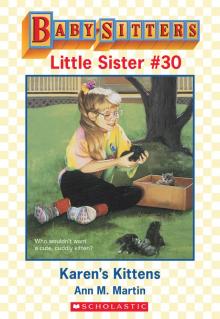 Karen's Kittens
Karen's Kittens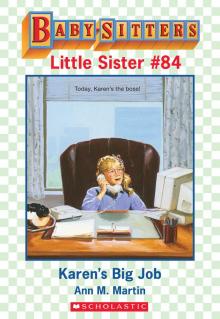 Karen's Big Job
Karen's Big Job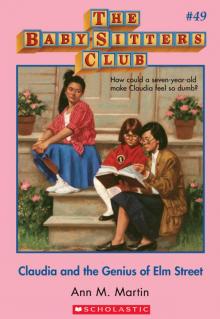 Claudia and the Genius of Elm Street
Claudia and the Genius of Elm Street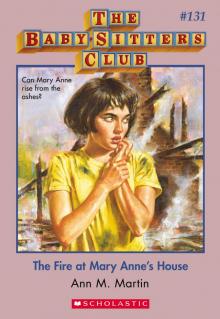 The Fire at Mary Anne's House
The Fire at Mary Anne's House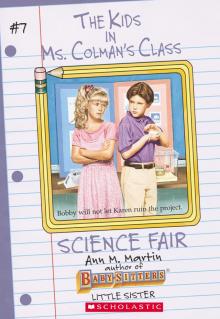 Science Fair
Science Fair Me and Katie (The Pest)
Me and Katie (The Pest)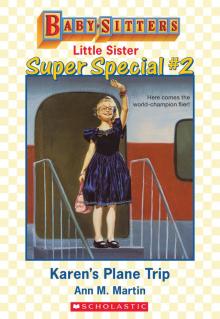 Karen's Plane Trip
Karen's Plane Trip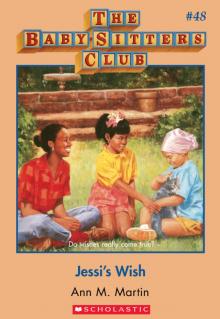 Jessi's Wish
Jessi's Wish Dawn and Too Many Sitters
Dawn and Too Many Sitters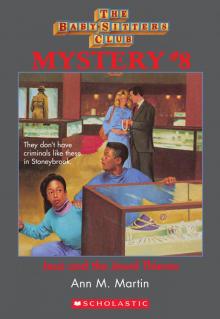 Jessi and the Jewel Thieves
Jessi and the Jewel Thieves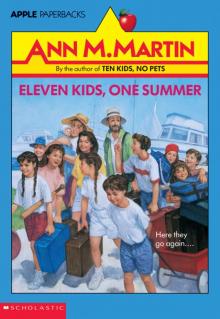 Eleven Kids, One Summer
Eleven Kids, One Summer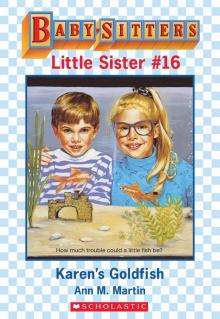 Karen's Goldfish
Karen's Goldfish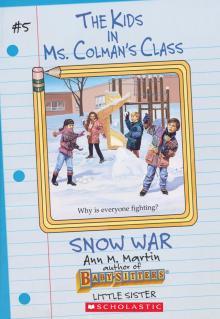 Snow War
Snow War Abby and the Secret Society
Abby and the Secret Society Keeping Secrets
Keeping Secrets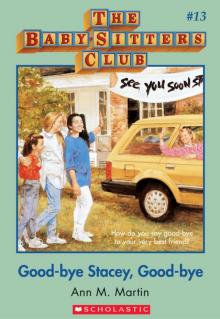 Good-Bye Stacey, Good-Bye
Good-Bye Stacey, Good-Bye Karen's Sleepover
Karen's Sleepover Claudia and the World's Cutest Baby
Claudia and the World's Cutest Baby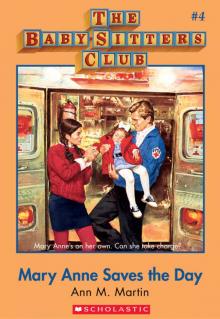 Mary Anne Saves the Day
Mary Anne Saves the Day Mallory and the Dream Horse
Mallory and the Dream Horse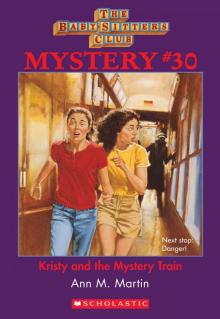 Kristy and the Mystery Train
Kristy and the Mystery Train Dawn's Family Feud
Dawn's Family Feud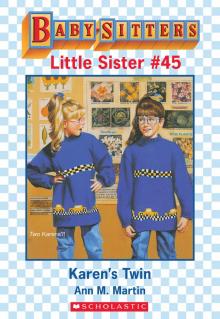 Karen's Twin
Karen's Twin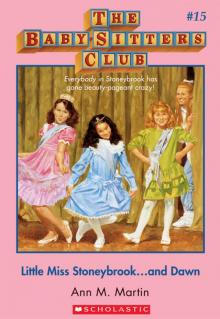 Little Miss Stoneybrook... And Dawn
Little Miss Stoneybrook... And Dawn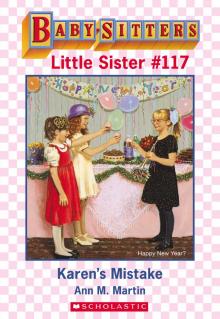 Karen's Mistake
Karen's Mistake Karen's Movie Star
Karen's Movie Star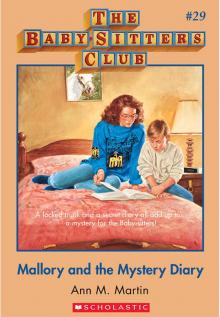 Mallory and the Mystery Diary
Mallory and the Mystery Diary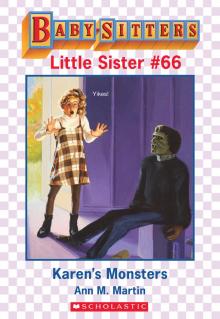 Karen's Monsters
Karen's Monsters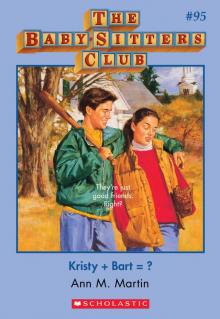 Kristy + Bart = ?
Kristy + Bart = ?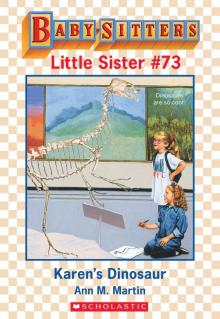 Karen's Dinosaur
Karen's Dinosaur Here Today
Here Today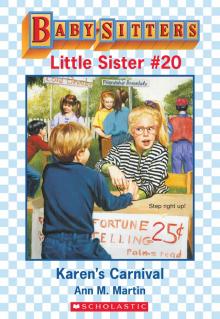 Karen's Carnival
Karen's Carnival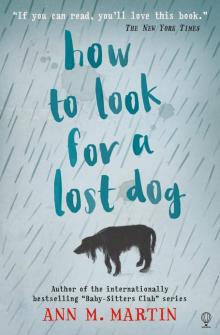 How to Look for a Lost Dog
How to Look for a Lost Dog Stacey vs. Claudia
Stacey vs. Claudia Stacey's Ex-Boyfriend
Stacey's Ex-Boyfriend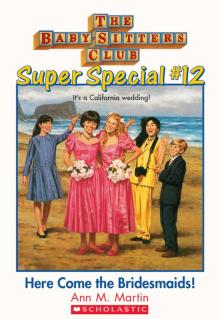 Here Come the Bridesmaids!
Here Come the Bridesmaids! Graduation Day
Graduation Day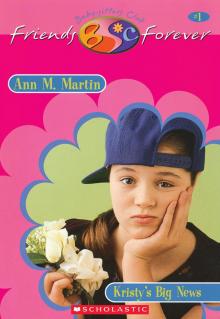 Kristy's Big News
Kristy's Big News Karen's School Surprise
Karen's School Surprise Kristy Thomas, Dog Trainer
Kristy Thomas, Dog Trainer Baby-Sitters' Christmas Chiller
Baby-Sitters' Christmas Chiller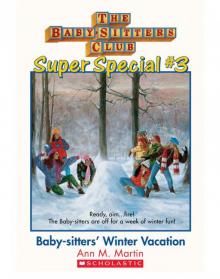 Baby-Sitters' Winter Vacation
Baby-Sitters' Winter Vacation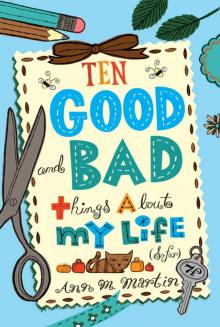 Ten Good and Bad Things About My Life
Ten Good and Bad Things About My Life Claudia and the Bad Joke
Claudia and the Bad Joke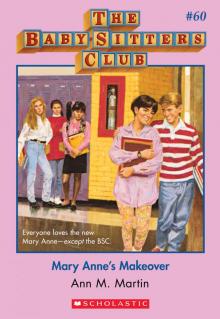 Mary Anne's Makeover
Mary Anne's Makeover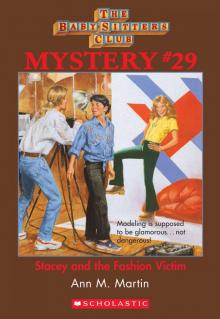 Stacey and the Fashion Victim
Stacey and the Fashion Victim Dawn Schafer, Undercover Baby-Sitter
Dawn Schafer, Undercover Baby-Sitter Karen's Tuba
Karen's Tuba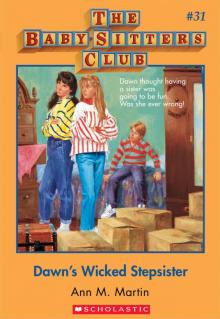 Dawn's Wicked Stepsister
Dawn's Wicked Stepsister Diary Three: Dawn, Sunny, Maggie, Amalia, and Ducky
Diary Three: Dawn, Sunny, Maggie, Amalia, and Ducky Karen's Nanny
Karen's Nanny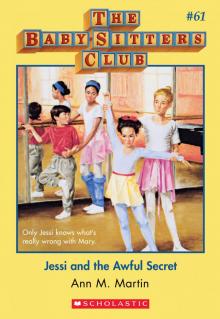 Jessi and the Awful Secret
Jessi and the Awful Secret Karen's New Year
Karen's New Year Karen's Candy
Karen's Candy Karen's President
Karen's President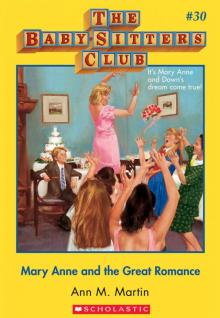 Mary Anne and the Great Romance
Mary Anne and the Great Romance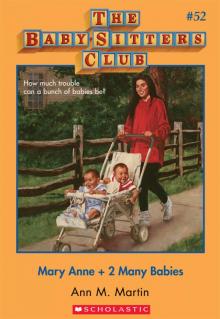 Mary Anne + 2 Many Babies
Mary Anne + 2 Many Babies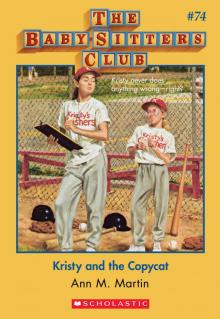 Kristy and the Copycat
Kristy and the Copycat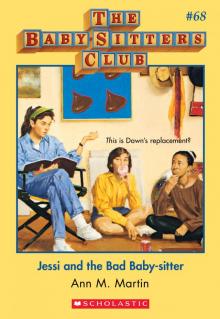 Jessi and the Bad Baby-Sitter
Jessi and the Bad Baby-Sitter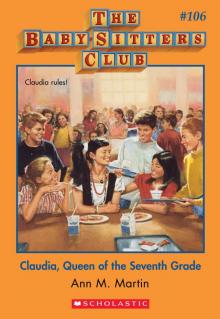 Claudia, Queen of the Seventh Grade
Claudia, Queen of the Seventh Grade Claudia and the Lighthouse Ghost
Claudia and the Lighthouse Ghost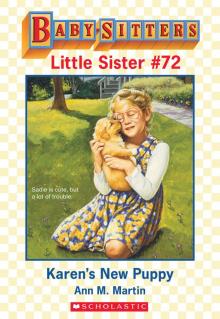 Karen's New Puppy
Karen's New Puppy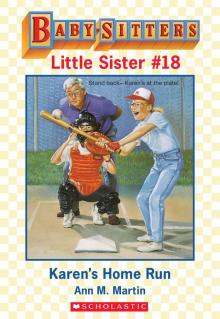 Karen's Home Run
Karen's Home Run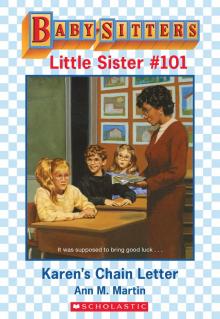 Karen's Chain Letter
Karen's Chain Letter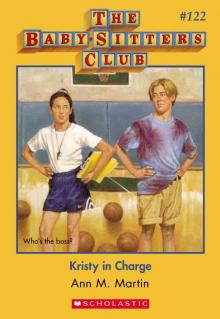 Kristy in Charge
Kristy in Charge Karen's Angel
Karen's Angel Mary Anne and Too Many Boys
Mary Anne and Too Many Boys Karen's Big Fight
Karen's Big Fight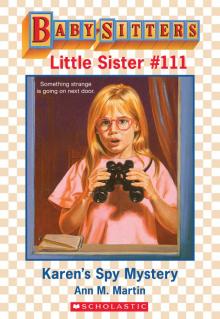 Karen's Spy Mystery
Karen's Spy Mystery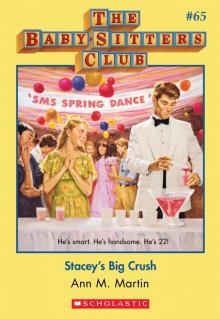 Stacey's Big Crush
Stacey's Big Crush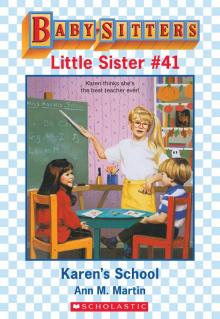 Karen's School
Karen's School Claudia and the Terrible Truth
Claudia and the Terrible Truth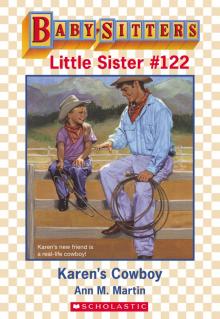 Karen's Cowboy
Karen's Cowboy The Summer Before
The Summer Before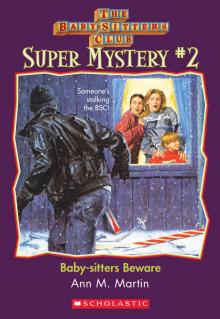 Beware, Dawn!
Beware, Dawn! Belle Teale
Belle Teale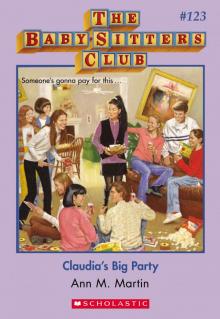 Claudia's Big Party
Claudia's Big Party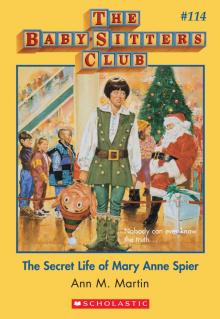 The Secret Life of Mary Anne Spier
The Secret Life of Mary Anne Spier Karen's Book
Karen's Book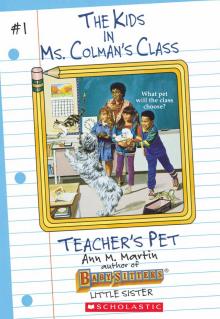 Teacher's Pet
Teacher's Pet Boy-Crazy Stacey
Boy-Crazy Stacey Claudia and the Disaster Date
Claudia and the Disaster Date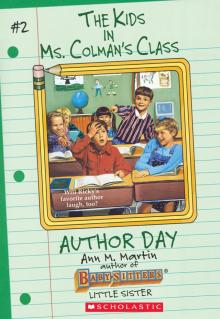 Author Day
Author Day Claudia and the Sad Good-Bye
Claudia and the Sad Good-Bye Kristy and the Worst Kid Ever
Kristy and the Worst Kid Ever Yours Turly, Shirley
Yours Turly, Shirley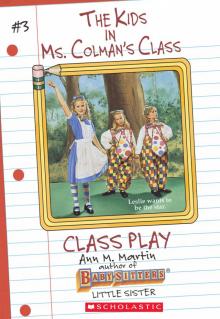 Class Play
Class Play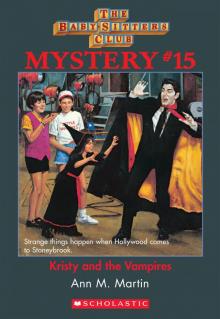 Kristy and the Vampires
Kristy and the Vampires Kristy and the Cat Burglar
Kristy and the Cat Burglar Karen's Pumpkin Patch
Karen's Pumpkin Patch Stacey and the Mystery at the Empty House
Stacey and the Mystery at the Empty House Karen's Chicken Pox
Karen's Chicken Pox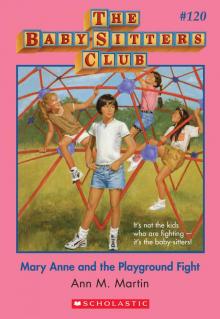 Mary Anne and the Playground Fight
Mary Anne and the Playground Fight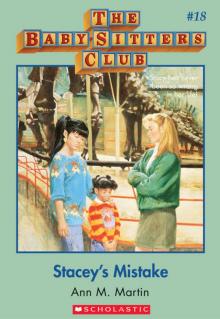 Stacey's Mistake
Stacey's Mistake Coming Apart
Coming Apart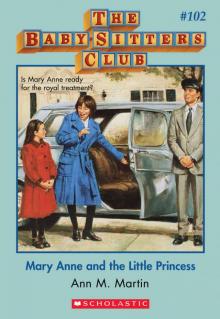 Mary Anne and the Little Princess
Mary Anne and the Little Princess Karen, Hannie and Nancy: The Three Musketeers
Karen, Hannie and Nancy: The Three Musketeers 'Tis the Season
'Tis the Season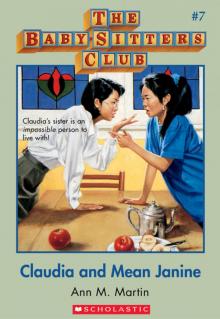 Claudia and Mean Janine
Claudia and Mean Janine Karen's School Bus
Karen's School Bus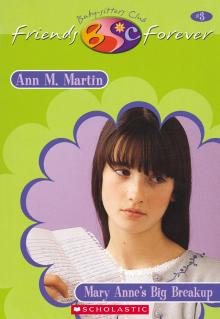 Mary Anne's Big Breakup
Mary Anne's Big Breakup Rain Reign
Rain Reign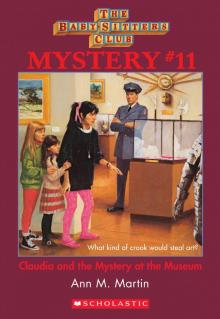 Claudia and the Mystery at the Museum
Claudia and the Mystery at the Museum Claudia and the Great Search
Claudia and the Great Search Karen's Doll
Karen's Doll Shannon's Story
Shannon's Story Sea City, Here We Come!
Sea City, Here We Come! Stacey and the Mystery of Stoneybrook
Stacey and the Mystery of Stoneybrook Karen's Treasure
Karen's Treasure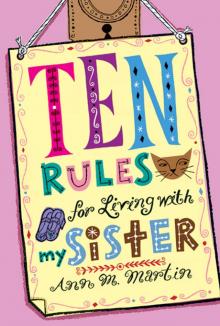 Ten Rules for Living With My Sister
Ten Rules for Living With My Sister With You and Without You
With You and Without You Baby-Sitters' Island Adventure
Baby-Sitters' Island Adventure Karen's Fishing Trip
Karen's Fishing Trip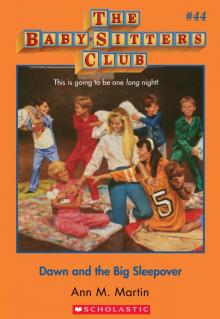 Dawn and the Big Sleepover
Dawn and the Big Sleepover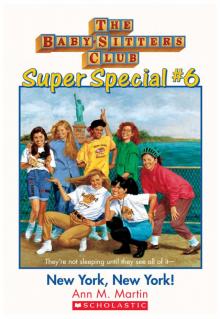 New York, New York!
New York, New York! Ten Kids, No Pets
Ten Kids, No Pets Happy Holidays, Jessi
Happy Holidays, Jessi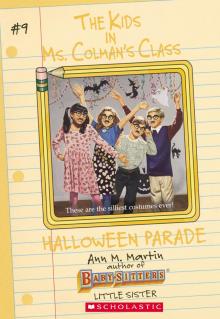 Halloween Parade
Halloween Parade Karen's New Holiday
Karen's New Holiday Kristy Power!
Kristy Power! Karen's Wish
Karen's Wish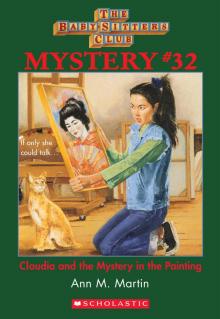 Claudia and the Mystery in the Painting
Claudia and the Mystery in the Painting Karen's Stepmother
Karen's Stepmother Abby in Wonderland
Abby in Wonderland Karen's Snow Day
Karen's Snow Day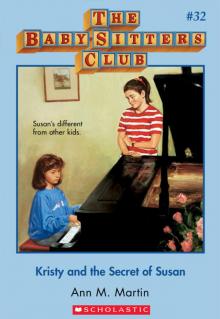 Kristy and the Secret of Susan
Kristy and the Secret of Susan Karen's Pony Camp
Karen's Pony Camp Karen's School Trip
Karen's School Trip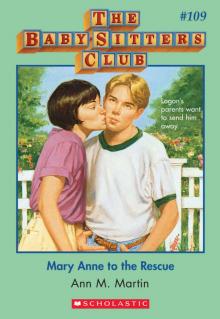 Mary Anne to the Rescue
Mary Anne to the Rescue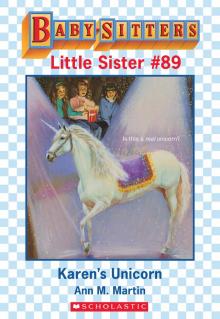 Karen's Unicorn
Karen's Unicorn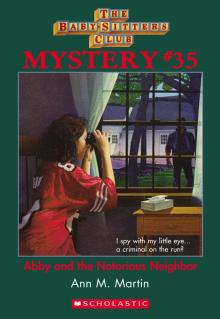 Abby and the Notorious Neighbor
Abby and the Notorious Neighbor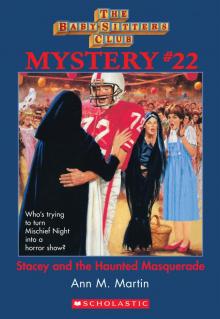 Stacey and the Haunted Masquerade
Stacey and the Haunted Masquerade Claudia Gets Her Guy
Claudia Gets Her Guy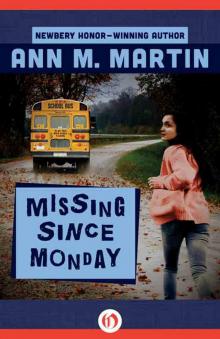 Missing Since Monday
Missing Since Monday Stacey's Choice
Stacey's Choice Stacey's Ex-Best Friend
Stacey's Ex-Best Friend Karen's New Teacher
Karen's New Teacher Karen's Accident
Karen's Accident Karen's Lucky Penny
Karen's Lucky Penny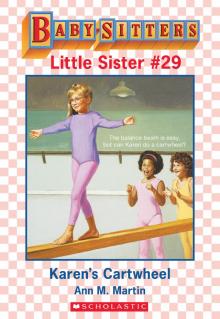 Karen's Cartwheel
Karen's Cartwheel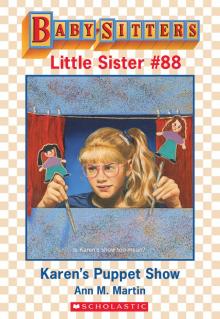 Karen's Puppet Show
Karen's Puppet Show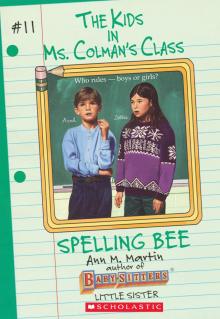 Spelling Bee
Spelling Bee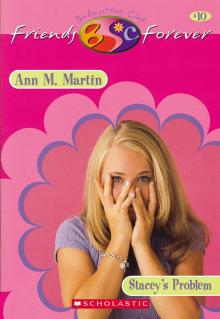 Stacey's Problem
Stacey's Problem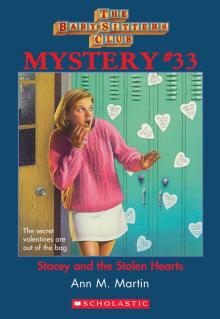 Stacey and the Stolen Hearts
Stacey and the Stolen Hearts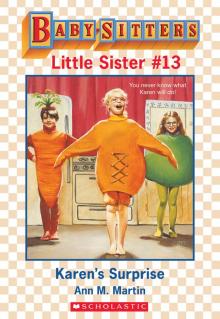 Karen's Surprise
Karen's Surprise Karen's Worst Day
Karen's Worst Day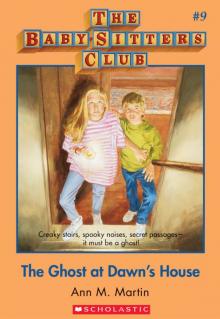 The Ghost at Dawn's House
The Ghost at Dawn's House Karen's Big Sister
Karen's Big Sister Karen's Easter Parade
Karen's Easter Parade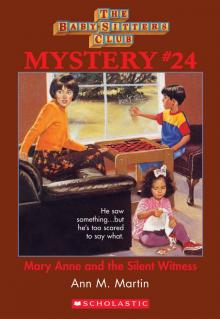 Mary Anne and the Silent Witness
Mary Anne and the Silent Witness Karen's Swim Meet
Karen's Swim Meet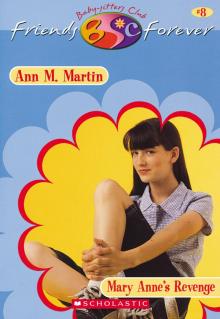 Mary Anne's Revenge
Mary Anne's Revenge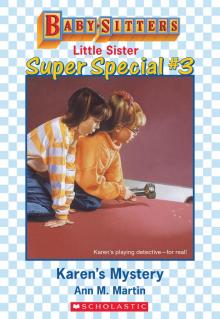 Karen's Mystery
Karen's Mystery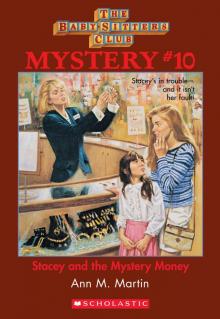 Stacey and the Mystery Money
Stacey and the Mystery Money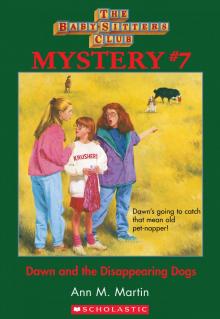 Dawn and the Disappearing Dogs
Dawn and the Disappearing Dogs Karen's Christmas Tree
Karen's Christmas Tree Welcome to Camden Falls
Welcome to Camden Falls Karen's Pilgrim
Karen's Pilgrim Dawn and the Halloween Mystery
Dawn and the Halloween Mystery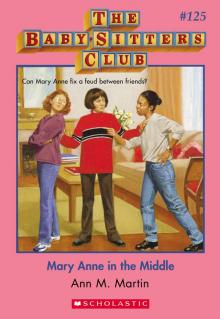 Mary Anne in the Middle
Mary Anne in the Middle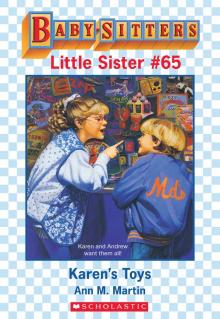 Karen's Toys
Karen's Toys Kristy's Great Idea
Kristy's Great Idea Claudia and the Middle School Mystery
Claudia and the Middle School Mystery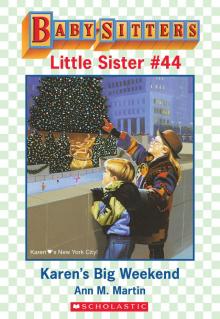 Karen's Big Weekend
Karen's Big Weekend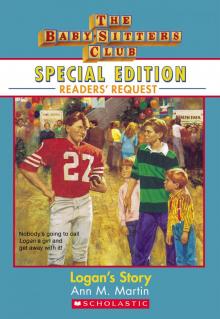 Logan's Story
Logan's Story Karen's Yo-Yo
Karen's Yo-Yo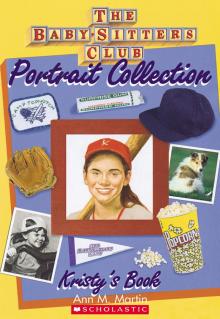 Kristy's Book
Kristy's Book Mallory and the Ghost Cat
Mallory and the Ghost Cat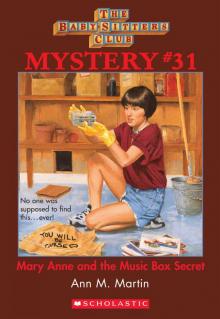 Mary Anne and the Music
Mary Anne and the Music Karen's Tattletale
Karen's Tattletale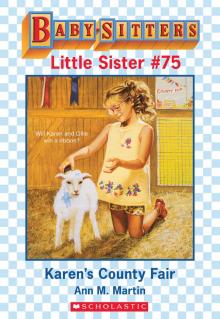 Karen's County Fair
Karen's County Fair Karen's Mermaid
Karen's Mermaid Snowbound
Snowbound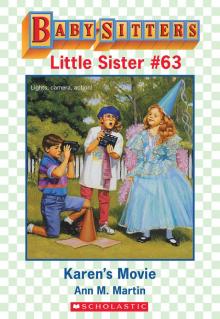 Karen's Movie
Karen's Movie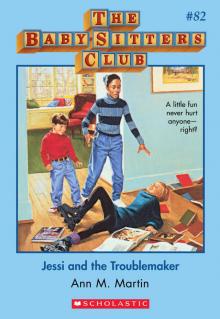 Jessi and the Troublemaker
Jessi and the Troublemaker Baby-Sitters at Shadow Lake
Baby-Sitters at Shadow Lake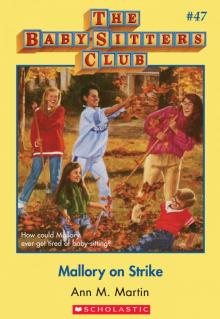 Mallory on Strike
Mallory on Strike Jessi's Baby-Sitter
Jessi's Baby-Sitter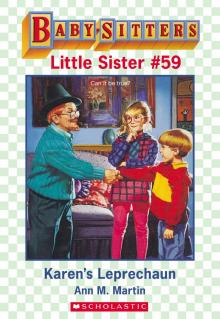 Karen's Leprechaun
Karen's Leprechaun Claudia and the Phantom Phone Calls
Claudia and the Phantom Phone Calls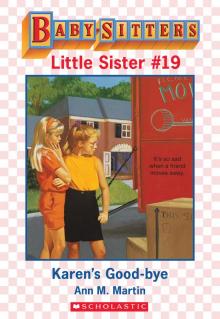 Karen's Good-Bye
Karen's Good-Bye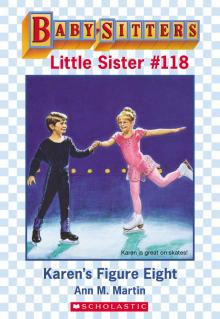 Karen's Figure Eight
Karen's Figure Eight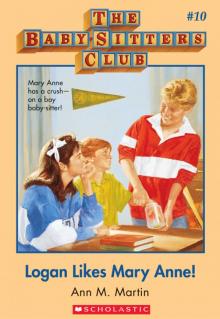 Logan Likes Mary Anne!
Logan Likes Mary Anne!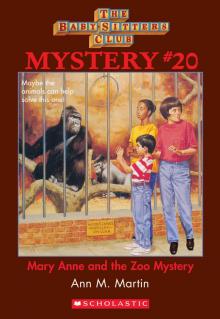 Mary Anne and the Zoo Mystery
Mary Anne and the Zoo Mystery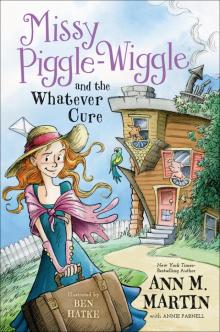 Missy Piggle-Wiggle and the Whatever Cure
Missy Piggle-Wiggle and the Whatever Cure Dawn on the Coast
Dawn on the Coast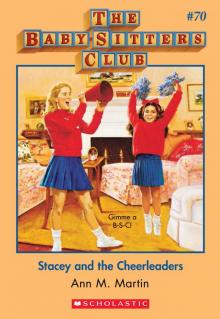 Stacey and the Cheerleaders
Stacey and the Cheerleaders Claudia and the Clue in the Photograph
Claudia and the Clue in the Photograph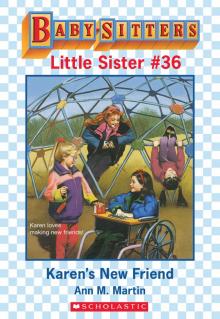 Karen's New Friend
Karen's New Friend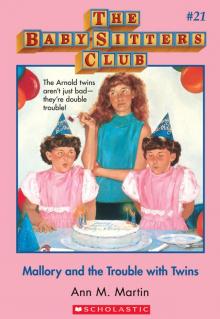 Mallory and the Trouble With Twins
Mallory and the Trouble With Twins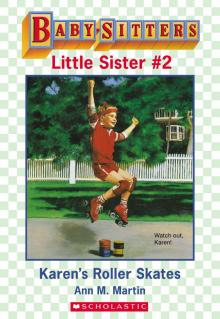 Karen's Roller Skates
Karen's Roller Skates Abby and the Best Kid Ever
Abby and the Best Kid Ever Poor Mallory!
Poor Mallory!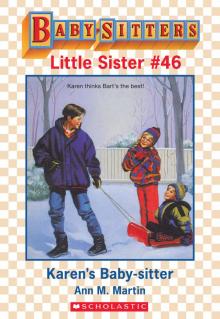 Karen's Witch
Karen's Witch Karen's Grandmothers
Karen's Grandmothers Slam Book
Slam Book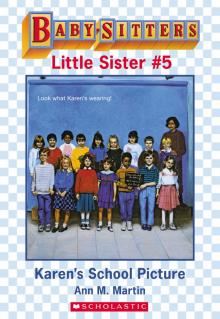 Karen's School Picture
Karen's School Picture Karen's Reindeer
Karen's Reindeer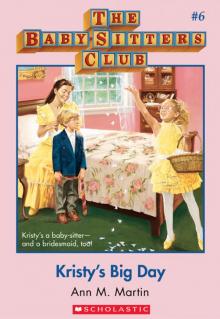 Kristy's Big Day
Kristy's Big Day The Long Way Home
The Long Way Home Karen's Sleigh Ride
Karen's Sleigh Ride On Christmas Eve
On Christmas Eve Karen's Copycat
Karen's Copycat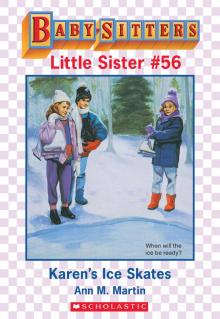 Karen's Ice Skates
Karen's Ice Skates Claudia and the Little Liar
Claudia and the Little Liar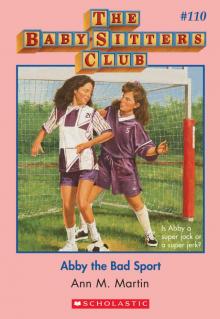 Abby the Bad Sport
Abby the Bad Sport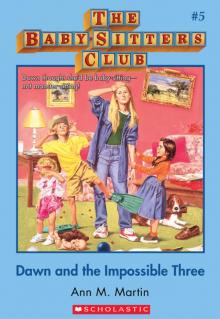 The Baby-Sitters Club #5: Dawn and the Impossible Three
The Baby-Sitters Club #5: Dawn and the Impossible Three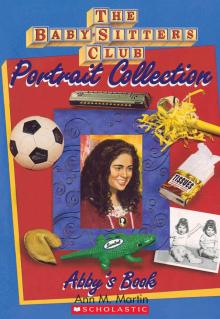 Abby's Book
Abby's Book Karen's Big Top
Karen's Big Top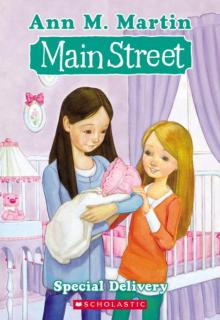 Main Street #8: Special Delivery
Main Street #8: Special Delivery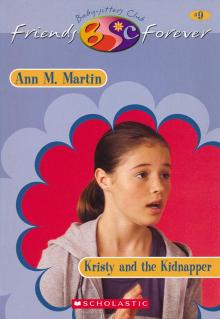 Kristy and the Kidnapper
Kristy and the Kidnapper Karen's Ski Trip
Karen's Ski Trip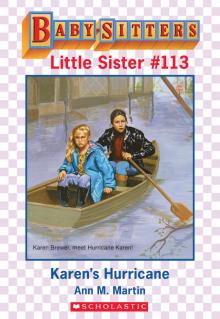 Karen's Hurricane
Karen's Hurricane Stacey and the Mystery at the Mall
Stacey and the Mystery at the Mall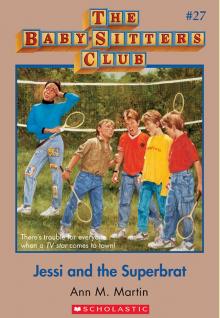 Jessi and the Superbrat
Jessi and the Superbrat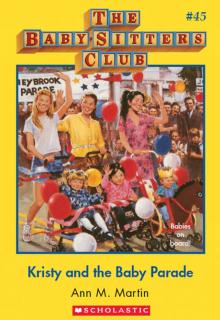 Kristy and the Baby Parade
Kristy and the Baby Parade Karen's New Bike
Karen's New Bike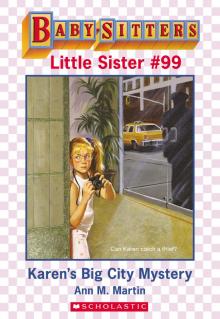 Karen's Big City Mystery
Karen's Big City Mystery Baby-Sitters' European Vacation
Baby-Sitters' European Vacation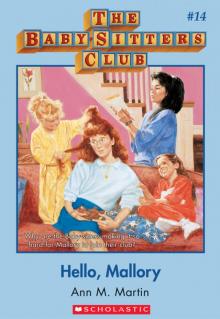 Hello, Mallory
Hello, Mallory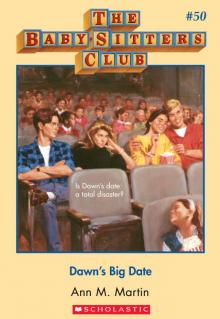 Dawn's Big Date
Dawn's Big Date Karen's Christmas Carol
Karen's Christmas Carol Jessi's Horrible Prank
Jessi's Horrible Prank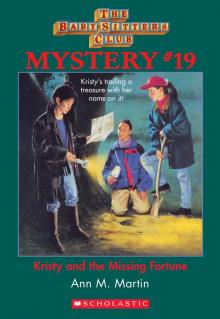 Kristy and the Missing Fortune
Kristy and the Missing Fortune Kristy and the Haunted Mansion
Kristy and the Haunted Mansion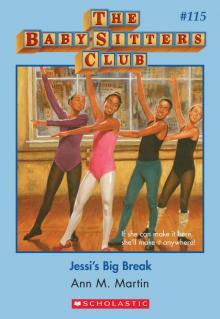 Jessi's Big Break
Jessi's Big Break Karen's Pony
Karen's Pony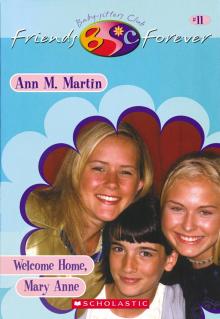 Welcome Home, Mary Anne
Welcome Home, Mary Anne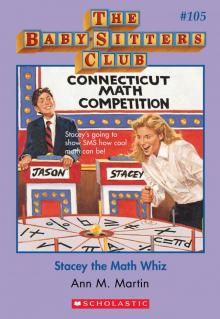 Stacey the Math Whiz
Stacey the Math Whiz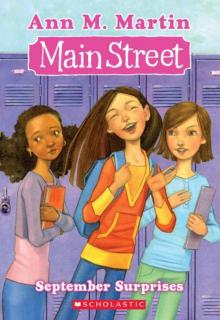 September Surprises
September Surprises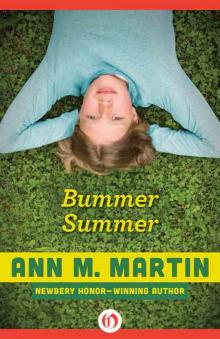 Bummer Summer
Bummer Summer Karen's Secret
Karen's Secret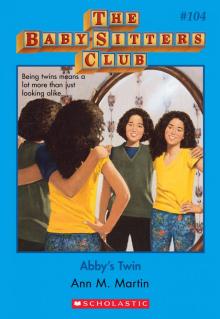 Abby's Twin
Abby's Twin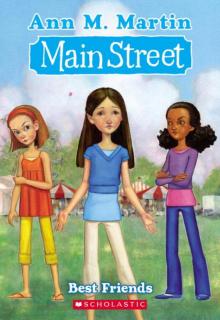 Main Street #4: Best Friends
Main Street #4: Best Friends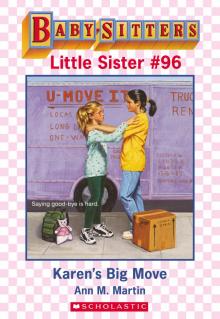 Karen's Big Move
Karen's Big Move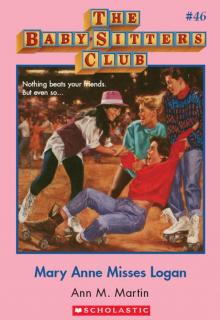 Mary Anne Misses Logan
Mary Anne Misses Logan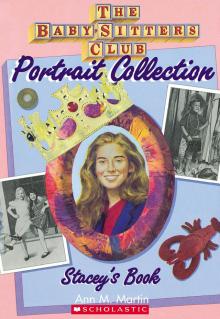 Stacey's Book
Stacey's Book Claudia and the Perfect Boy
Claudia and the Perfect Boy Holiday Time
Holiday Time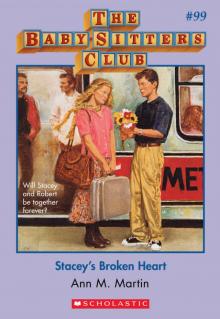 Stacey's Broken Heart
Stacey's Broken Heart Karen's Field Day
Karen's Field Day Kristy's Worst Idea
Kristy's Worst Idea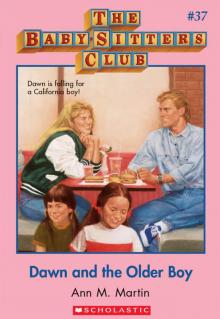 Dawn and the Older Boy
Dawn and the Older Boy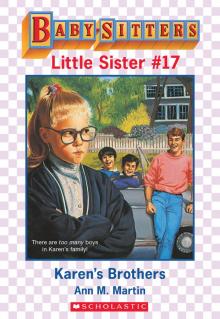 Karen's Brothers
Karen's Brothers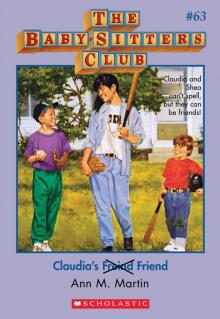 Claudia's Friend
Claudia's Friend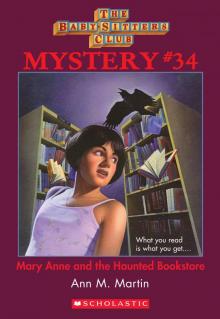 Mary Anne and the Haunted Bookstore
Mary Anne and the Haunted Bookstore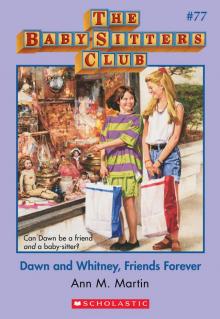 Dawn and Whitney, Friends Forever
Dawn and Whitney, Friends Forever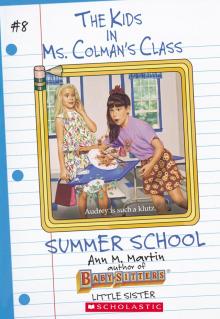 Summer School
Summer School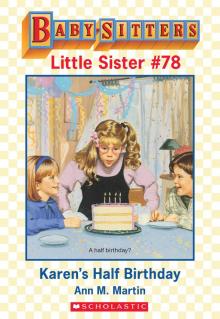 Karen's Birthday
Karen's Birthday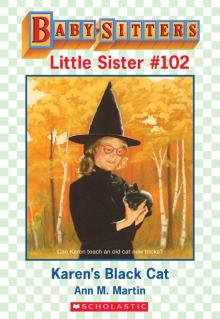 Karen's Black Cat
Karen's Black Cat Stacey McGill... Matchmaker?
Stacey McGill... Matchmaker? Claudia's Book
Claudia's Book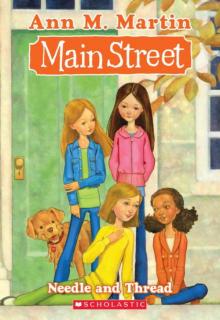 Main Street #2: Needle and Thread
Main Street #2: Needle and Thread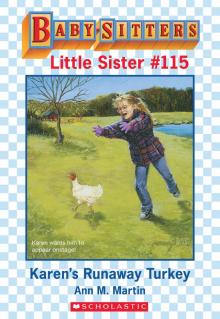 Karen's Runaway Turkey
Karen's Runaway Turkey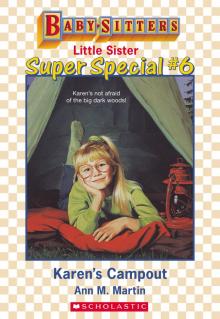 Karen's Campout
Karen's Campout Karen's Bunny
Karen's Bunny Claudia and the New Girl
Claudia and the New Girl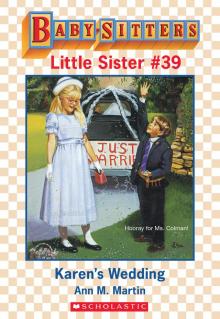 Karen's Wedding
Karen's Wedding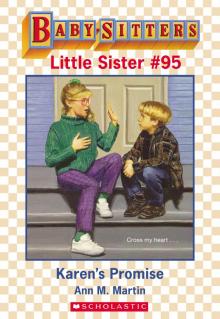 Karen's Promise
Karen's Promise Karen's Snow Princess
Karen's Snow Princess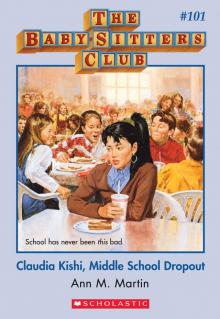 Claudia Kishi, Middle School Dropout
Claudia Kishi, Middle School Dropout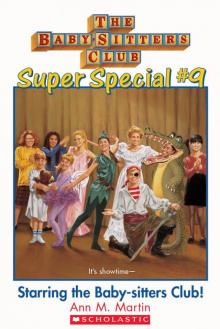 Starring the Baby-Sitters Club!
Starring the Baby-Sitters Club!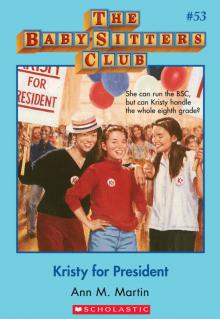 Kristy for President
Kristy for President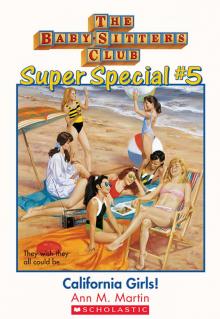 California Girls!
California Girls!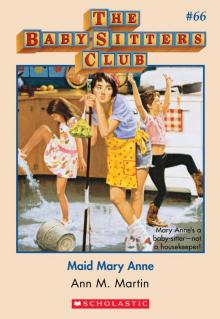 Maid Mary Anne
Maid Mary Anne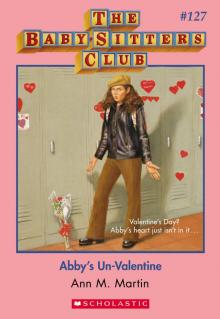 Abby's Un-Valentine
Abby's Un-Valentine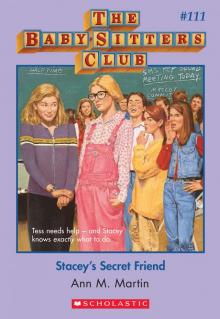 Stacey's Secret Friend
Stacey's Secret Friend Karen's Haunted House
Karen's Haunted House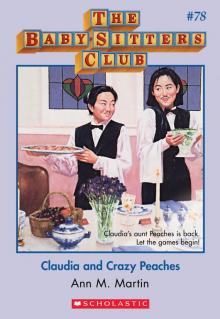 Claudia and Crazy Peaches
Claudia and Crazy Peaches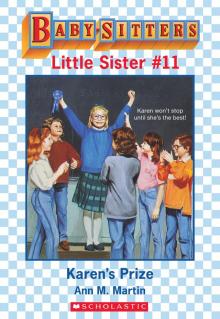 Karen's Prize
Karen's Prize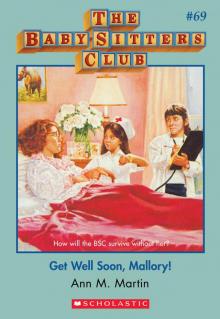 Get Well Soon, Mallory!
Get Well Soon, Mallory! Karen's Doll Hospital
Karen's Doll Hospital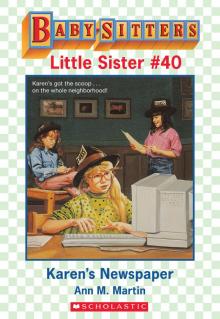 Karen's Newspaper
Karen's Newspaper Karen's Toothache
Karen's Toothache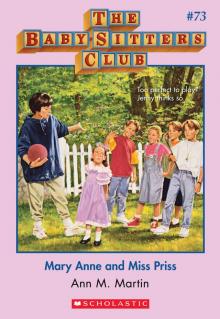 Mary Anne and Miss Priss
Mary Anne and Miss Priss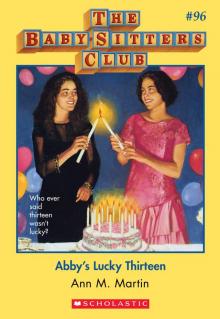 Abby's Lucky Thirteen
Abby's Lucky Thirteen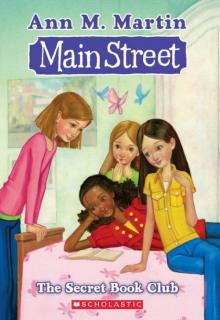 The Secret Book Club
The Secret Book Club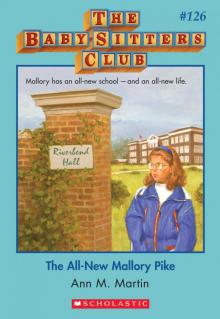 The All-New Mallory Pike
The All-New Mallory Pike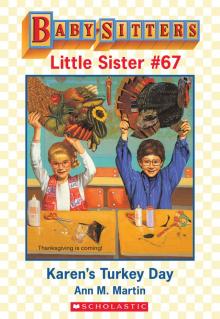 Karen's Turkey Day
Karen's Turkey Day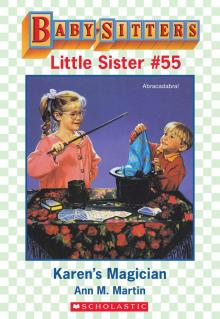 Karen's Magician
Karen's Magician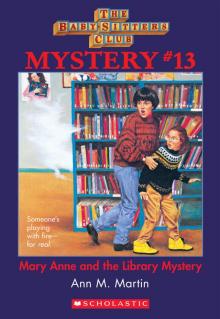 Mary Anne and the Library Mystery
Mary Anne and the Library Mystery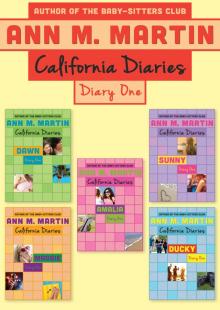 Diary One: Dawn, Sunny, Maggie, Amalia, and Ducky
Diary One: Dawn, Sunny, Maggie, Amalia, and Ducky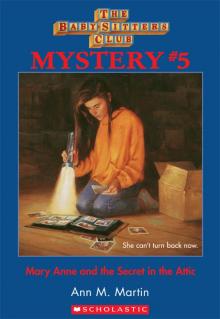 Mary Anne and the Secret in the Attic
Mary Anne and the Secret in the Attic Kristy and the Mother's Day Surprise
Kristy and the Mother's Day Surprise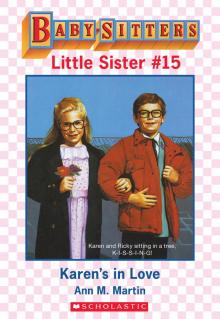 Karen's in Love
Karen's in Love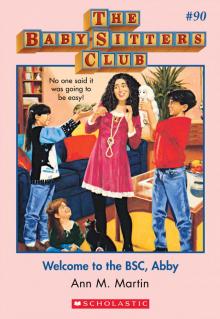 Welcome to the BSC, Abby
Welcome to the BSC, Abby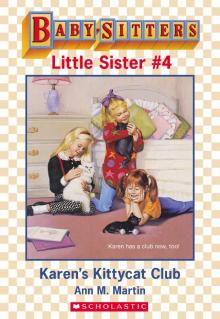 Karen's Kittycat Club
Karen's Kittycat Club The Mystery at Claudia's House
The Mystery at Claudia's House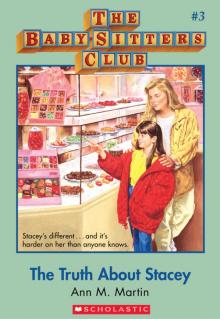 The Truth About Stacey
The Truth About Stacey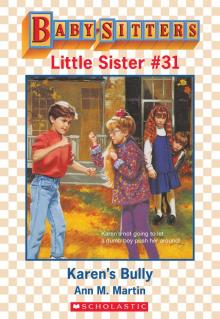 Karen's Bully
Karen's Bully Karen's Gift
Karen's Gift BSC in the USA
BSC in the USA Everything for a Dog
Everything for a Dog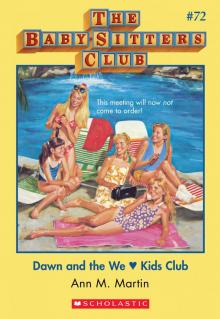 Dawn and the We Love Kids Club
Dawn and the We Love Kids Club Karen's Ghost
Karen's Ghost Stacey's Lie
Stacey's Lie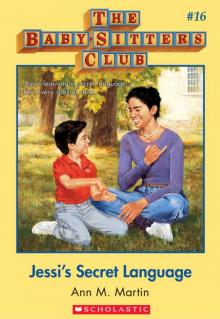 Jessi's Secret Language
Jessi's Secret Language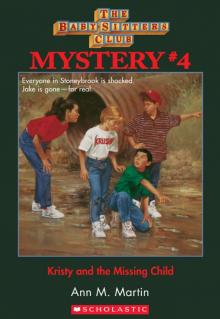 Kristy and the Missing Child
Kristy and the Missing Child Better to Wish
Better to Wish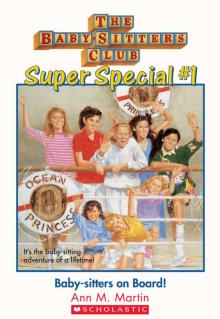 Baby-Sitters on Board!
Baby-Sitters on Board!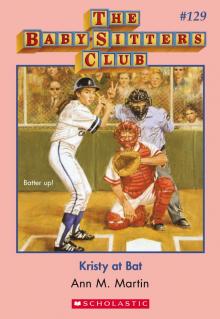 Kristy at Bat
Kristy at Bat Everything Changes
Everything Changes Don't Give Up, Mallory
Don't Give Up, Mallory A Dog's Life: The Autobiography of a Stray
A Dog's Life: The Autobiography of a Stray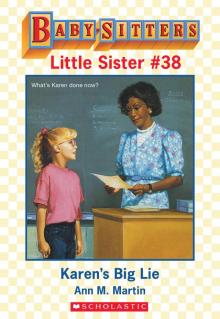 Karen's Big Lie
Karen's Big Lie Karen's Show and Share
Karen's Show and Share Mallory Hates Boys (and Gym)
Mallory Hates Boys (and Gym) Diary Two: Dawn, Sunny, Maggie, Amalia, and Ducky
Diary Two: Dawn, Sunny, Maggie, Amalia, and Ducky Karen's Pen Pal
Karen's Pen Pal Claudia and the Friendship Feud
Claudia and the Friendship Feud Karen's Secret Valentine
Karen's Secret Valentine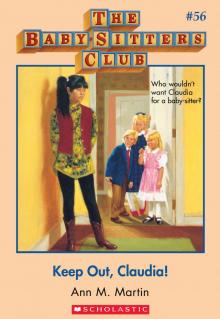 Keep Out, Claudia!
Keep Out, Claudia! Aloha, Baby-Sitters!
Aloha, Baby-Sitters! Welcome Back, Stacey
Welcome Back, Stacey Jessi Ramsey, Pet-Sitter
Jessi Ramsey, Pet-Sitter Karen's Pizza Party
Karen's Pizza Party Kristy and the Dirty Diapers
Kristy and the Dirty Diapers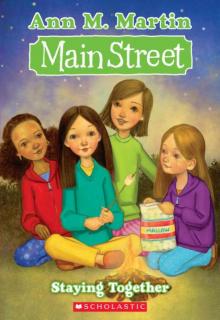 Staying Together
Staying Together Dawn and the Surfer Ghost
Dawn and the Surfer Ghost Claudia Makes Up Her Mind
Claudia Makes Up Her Mind Jessi's Gold Medal
Jessi's Gold Medal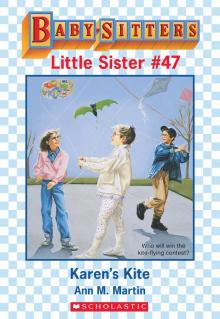 Karen's Kite
Karen's Kite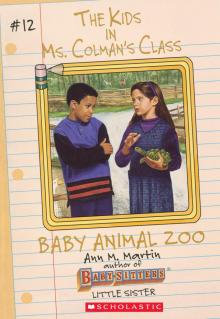 Baby Animal Zoo
Baby Animal Zoo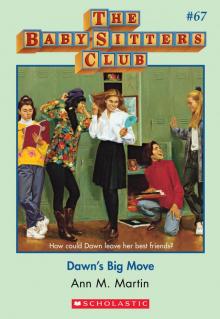 Dawn's Big Move
Dawn's Big Move Karen's Big Joke
Karen's Big Joke Karen's Lemonade Stand
Karen's Lemonade Stand Ma and Pa Dracula
Ma and Pa Dracula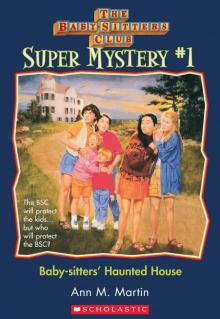 Baby-Sitters' Haunted House
Baby-Sitters' Haunted House Abby and the Mystery Baby
Abby and the Mystery Baby Home Is the Place
Home Is the Place Karen's Grandad
Karen's Grandad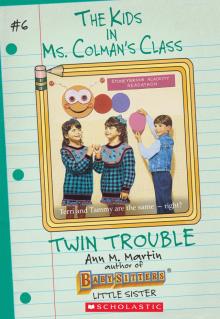 Twin Trouble
Twin Trouble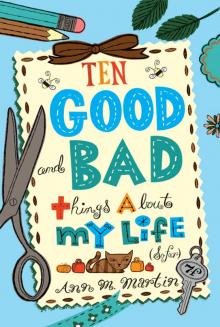 Ten Good and Bad Things About My Life (So Far)
Ten Good and Bad Things About My Life (So Far) Diary Two
Diary Two Baby-Sitters Club 027
Baby-Sitters Club 027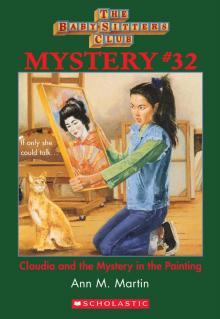 Claudia and the Mystery Painting
Claudia and the Mystery Painting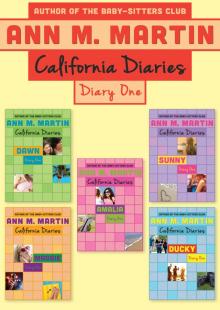 Diary One
Diary One Baby-Sitters Club 037
Baby-Sitters Club 037 Baby-Sitters Club 028
Baby-Sitters Club 028 Baby-Sitters Club 085
Baby-Sitters Club 085 Dawn Schaffer Undercover Baby-Sitter
Dawn Schaffer Undercover Baby-Sitter Jessi's Babysitter
Jessi's Babysitter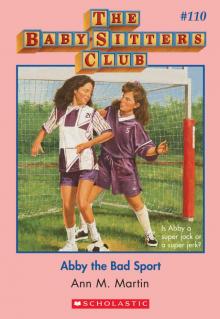 The Baby-Sitters Club #110: Abby the Bad Sport (Baby-Sitters Club, The)
The Baby-Sitters Club #110: Abby the Bad Sport (Baby-Sitters Club, The) Karen's Little Sister
Karen's Little Sister Baby-Sitters Club 058
Baby-Sitters Club 058 Claudia And The Genius On Elm St.
Claudia And The Genius On Elm St. Missy Piggle-Wiggle and the Sticky-Fingers Cure
Missy Piggle-Wiggle and the Sticky-Fingers Cure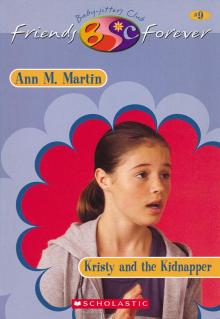 Kristy and Kidnapper
Kristy and Kidnapper Baby-Sitters Club 041
Baby-Sitters Club 041 Karen's Bunny Trouble
Karen's Bunny Trouble Baby-Sitters Club 032
Baby-Sitters Club 032 Diary Three
Diary Three Christmas Chiller
Christmas Chiller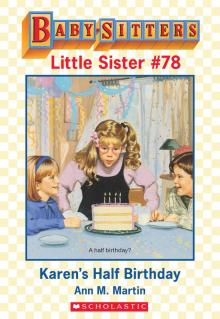 Karen's Half-Birthday
Karen's Half-Birthday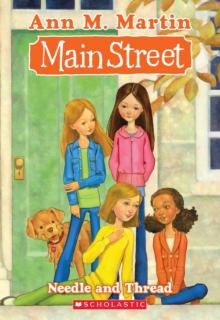 Needle and Thread
Needle and Thread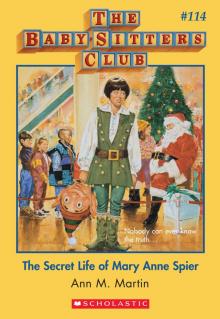 Secret Life of Mary Anne Spier
Secret Life of Mary Anne Spier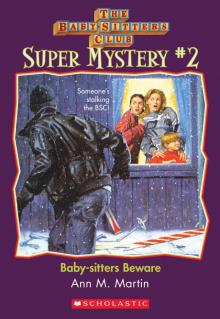 Baby-Sitters Beware
Baby-Sitters Beware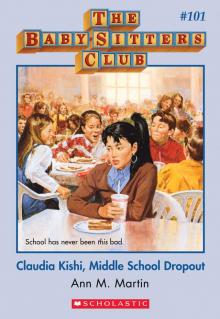 Claudia Kishi, Middle School Drop-Out
Claudia Kishi, Middle School Drop-Out Logan Likes Mary Anne !
Logan Likes Mary Anne ! Baby-Sitters Club 061
Baby-Sitters Club 061 Best Friends
Best Friends Baby-Sitters Club 031
Baby-Sitters Club 031 Karen's Little Witch
Karen's Little Witch Jessi Ramsey, Petsitter
Jessi Ramsey, Petsitter Baby-Sitters Club 123
Baby-Sitters Club 123 Baby-Sitters Club 059
Baby-Sitters Club 059 Baby-Sitters Club 033
Baby-Sitters Club 033 Baby-Sitters Club 060
Baby-Sitters Club 060 Baby-Sitters Club 094
Baby-Sitters Club 094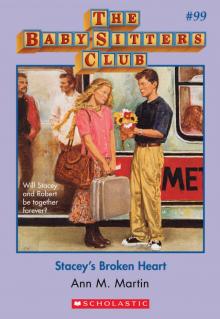 The Baby-Sitters Club #99: Stacey's Broken Heart
The Baby-Sitters Club #99: Stacey's Broken Heart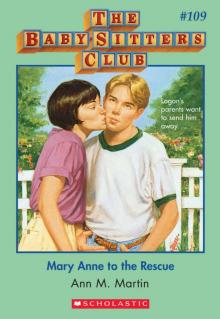 The Baby-Sitters Club #109: Mary Anne to the Rescue (Baby-Sitters Club, The)
The Baby-Sitters Club #109: Mary Anne to the Rescue (Baby-Sitters Club, The) Mystery At Claudia's House
Mystery At Claudia's House Claudia And The Sad Goodbye
Claudia And The Sad Goodbye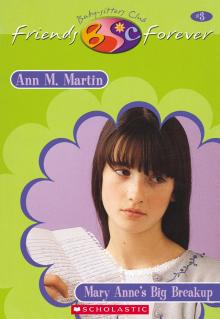 Mary Anne's Big Break-Up
Mary Anne's Big Break-Up Baby-Sitters Club 025
Baby-Sitters Club 025 Baby-Sitters Club 042
Baby-Sitters Club 042 Stacey and the Mystery of the Empty House
Stacey and the Mystery of the Empty House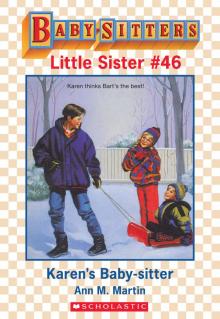 Karen's Baby-Sitter
Karen's Baby-Sitter Claudia's Friendship Feud
Claudia's Friendship Feud Baby-Sitters Club 090
Baby-Sitters Club 090 Baby-Sitters Club 021
Baby-Sitters Club 021 Baby-Sitters Club 056
Baby-Sitters Club 056 Baby-Sitters Club 040
Baby-Sitters Club 040 The Baby-Sitters Club #108: Don't Give Up, Mallory (Baby-Sitters Club, The)
The Baby-Sitters Club #108: Don't Give Up, Mallory (Baby-Sitters Club, The)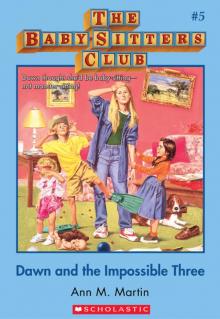 Dawn and the Impossible Three
Dawn and the Impossible Three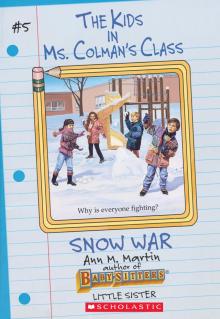 The Snow War
The Snow War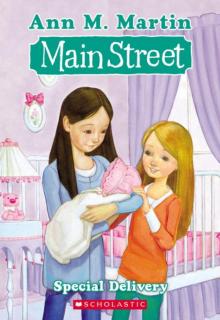 Special Delivery
Special Delivery Baby-Sitters Club 057
Baby-Sitters Club 057 Mary Anne And Too Many Babies
Mary Anne And Too Many Babies Baby-Sitters Club 030
Baby-Sitters Club 030